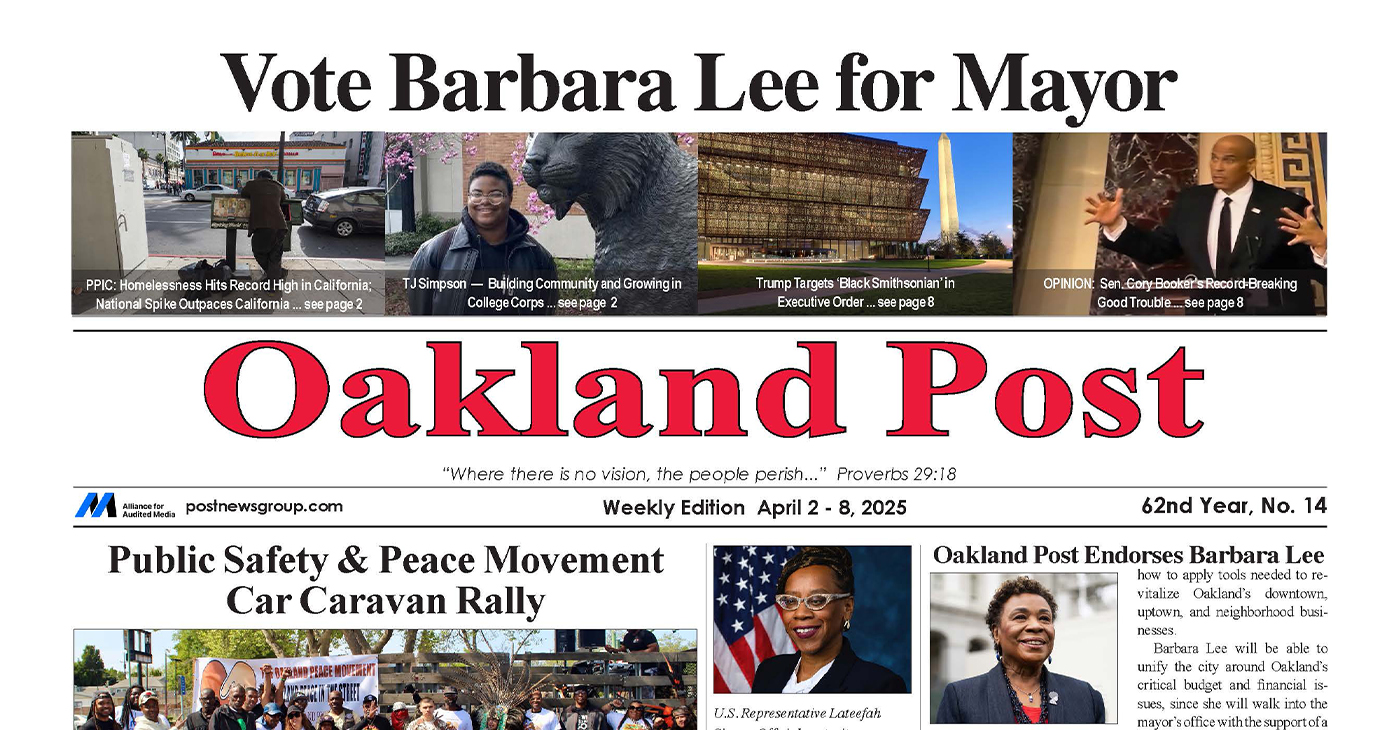Community
Bay Area Mayors, Advocates Urge Congressional Delegation to Make Historic Investments in Housing
Leaders Rally Around Long-term Solutions to Region’s Affordability Crisis

A coalition of elected leaders, private, and philanthropic partners sent a letter (http://ow.ly/DBuJ50FNGsX) to the region’s federal legislators on August 10 calling on them to include historic investments in affordable housing in the upcoming budget reconciliation legislation before Congress.
San Francisco Mayor London Breed, San Jose Mayor Sam Liccardo, and Oakland Mayor Libby Schaaf were joined by many of the region’s leading housing providers, advocates, and experts to urge California members of Congress to:
- Ensure anyone eligible for a housing voucher can get one by making vouchers a federal entitlement.
- Enact House Financial Services Chairman Maxine Waters’ Housing is Infrastructure Act of 2021, which would provide over $600 billion in affordable, equitable housing infrastructure; and focus resources in the region using flexible models such as the Bay Area Housing Finance Authority.
- Strengthen the Low-Income Housing Tax Credit program by increasing the number of credits, which would create over 330,000 new housing units in California.
This coalition stemmed from a regional effort to build on local economic recovery task forces and to align behind key priorities to rebuild and regrow a Bay Area where everyone can thrive. It recognizes that affordable housing is a critical priority to ensure an equitable recovery. The coalition noted:
“In the Bay Area and around California, our communities face an acute shortage of affordable housing, worsened by a pandemic that has further revealed the vast inequities, especially facing Black, Brown, Asian Pacific Islander, and Indigenous communities…”
“…Advancing these priorities will spur desperately needed affordable housing production and ensure all residents have access to a safe, affordable place to call home.”
A copy of the letter can be found at http://ow.ly/DBuJ50FNGsX, and the full text is included below:
The Honorable Dianne Feinstein, U.S. Senate,
The Honorable Alex Padilla, U.S. Senate,
The Honorable Nancy Pelosi, U.S. House of Representatives,
The Honorable Mark DeSaulnier, U.S. House of Representatives ,
The Honorable Anna Eshoo, U.S. House of Representatives,
The Honorable John Garamendi, U.S. House of Representatives,
The Honorable Jared Huffman, U.S. House of Representatives,
The Honorable Ro Khanna, U.S. House of Representatives,
The Honorable Barbara Lee, U.S. House of Representatives,
The Honorable Zoe Lofgren, U.S. House of Representatives,
The Honorable Jerry McNerney, U.S. House of Representatives,
The Honorable Jackie Speier, U.S. House of Representatives,
The Honorable Eric Swalwell, U.S. House of Representatives,
The Honorable Mike Thompson, U.S. House of Representatives
Re: Housing Priorities for the Bay Area Region
Dear Bay Area Congressional Delegation Members:
Thank you for your historic, ongoing leadership in providing critical resources to the nation – and the Bay Area – to recover from the health, economic, and housing consequences of the COVID-19 pandemic. We have come together across the private, public, and nonprofit sectors to work in collaboration toward a more equitable housing recovery in our region, home to over 7.7 million people, and look to your leadership in helping us secure key housing investments, which only the federal government can meet.
Cities and counties across the region convened local economic recovery task forces early in the pandemic, identifying local priorities and actions to provide immediate relief and advance local recovery strategies. To build on the work of the regional economic recovery task forces, a coalition of public, private, and philanthropic partners came together to identify our region’s most pressing state and federal priorities to ensure an equitable recovery. Common across the Bay Area was the recognition of affordable housing as a critical priority to ensure an equitable recovery.
In the Bay Area and around California, our communities face an acute shortage of affordable housing, worsened by a pandemic that has further revealed the vast inequities, especially facing Black, Brown, Asian Pacific Islander, and Indigenous communities. While there are numerous causes, millions of California families are housing insecure:
- Tens of thousands are homeless. In 2019, 35,028 individuals were experiencing homelessness in Bay Area counties.
- Overall, 137,500 households, including 86,600 low-income Bay Area households, are at risk of eviction and collectively owe $256 million in rent debt. If 10% of currently at-risk households became homeless, that would lead to a 44% increase in homelessness.
- The vast majority of renters who are behind on their rent have experienced job and income losses during the pandemic: 78% have lost employment income, while 81% earn less than $75,000.
- As of 2017, 71% of necessary permits were issued for above moderate-income units, compared with only 9% to 13% for either very low, low, or moderate-income units in the current 2015 to 2023 housing cycle.
- Due to generations of disinvestment, Black, Latinx, Native American, Mixed/other renters are more likely to be rent-burdened, particularly among female-headed renter households. Eighty-eight percent of renters who are behind on rent are people of color. Moreover, Black residents represent 29% of people experiencing homelessness in the region but only 6% of Bay Area residents.
As a coalition of leading housing providers, advocates, and experts working in the region, we are requesting that you fight on behalf of the following federal priorities that will directly improve millions of lives in the Bay Area:
- Transform the Housing Choice Voucher program into a federal entitlement so that every household that qualifies for assistance can receive it. We urge you to support House Financial Services Chairwoman Maxine Waters’ visionary effort to advance this goal through the inclusion of the Ending Homelessness Act of 2021 in reconciliation legislation this year. In addition to making vouchers an entitlement, the comprehensive Ending Homelessness Act of 2021 provides protections against discrimination based on source of income and funding for supportive services, creation of permanent affordable housing for people experiencing homelessness, and technical assistance for relevant state and local authorities. Together, these actions could end widespread homelessness as we know it.
- Invest in affordable housing in reconciliation legislation this year by including Chairwoman Waters’ Housing is Infrastructure Act of 2021, which would provide over $600 billion in housing infrastructure; and include in this flexible funding for innovative regional approaches for more equitable housing solutions. This transformational legislation would address the acute shortage of affordable housing and advance equity in the Bay Area and other parts of the country by investing in the creation and preservation of affordable and accessible housing, public housing, and community development, with set-asides for high and persistent poverty communities and measures that improve equitable planning and development processes to affirmatively advance fair housing. In addition, fully funding cross-jurisdictional solutions, such as the Bay Area Housing Finance Authority (BAHFA), within these programs will allow regions and metro areas across the country to elevate a commitment to racial equity, foster innovation to integrate housing solutions with regional transportation and climate strategies, and make each dollar invested in housing goes further than other piecemeal approaches would otherwise accomplish.
- Strengthen the Low Income Housing Tax Credit – a crucial tool in the production of affordable housing – by enacting the bipartisan, bicameral Affordable Housing Credit Improvement Act (AHCIA). Since its inception in 1986, the Low Income Housing Tax Credit (LIHTC) has built or rehabilitated more than 3.5 million affordable housing units, making it the most successful federal policy to produce affordable rental housing. We thank you for your support of this meaningful tax credit. Today, AHCIA is needed to expand its impact in order to meet the scope of the current affordable housing crisis. AHCIA would help build more than two million new affordable housing units across the country, including 330,000 in California alone, in the next decade by increasing the amount of credits allocated to each state by 50 percent, increasing the number of affordable housing projects that can be built using private activity bonds, and making improvements to the LIHTC to better serve victims of domestic violence, formerly homeless students, Native American communities, veterans, and rural Americans.
Advancing these priorities will spur desperately needed affordable housing production and ensure all residents have access to a safe, affordable place to call home. Thank you for contacting Christa Brown with the San Francisco Foundation so we can further discuss these priorities in the near future.
Sincerely,
| London Breed Mayor, City of San Francisco |
Sam Liccardo Mayor, City of San Jose |
Libby Schaaf Mayor, City of Oakland |
| Tomiquia Moss Founder & Chief Executive, All Home |
Margaret Peterson CEO, Catholic Charities East Bay |
Monique Berlanga Interim Executive Director, Centro Legal de La Raza |
| Malcolm Yeung Executive Director, Chinatown Community Development Center |
Don Gilmore Executive Director, Community Housing Development Corporation |
James W. Head President & CEO, East Bay Community Foundation |
| Michael McAfee President and CEO, PolicyLink |
Priscilla Almodovar President and CEO, Enterprise Community Partners |
Cindy Wu Executive Director, LISC Bay Area |
| Leslye Corsiglia Executive Director, Silicon Valley @ Home |
Guillermo Mayer President & CEO, Public Advocates |
Fred Blackwell CEO, San Francisco Foundation |
| Nicole Taylor President and CEO, Silicon Valley Community Foundation |
Amie Fishman Executive Director, Nonprofit Housing Association of Northern California |
Gloria Bruce Executive Director, East Bay Housing Organization |
| Ellen Wu Executive Director, Urban Habitat |
Alicia John-Baptiste President and CEO, SPUR |
Omar Carrera CEO, Canal Alliance |
| Debra Gore-Mann President and CEO, The Greenlining Institute |
Derecka Mehrens Executive Director, Working Partnerships USA |
#NNPA BlackPress
Lawmakers Greenlight Reparations Study for Descendants of Enslaved Marylanders
BLACKPRESSUSA NEWSWIRE — Maryland lawmakers have approved Senate Bill 587, authorizing the creation of the Maryland Reparations Commission.

By Stacy M. Brown
BlackPressUSA.com Senior National Correspondent
Maryland lawmakers have approved Senate Bill 587, authorizing the creation of the Maryland Reparations Commission. The body will study and make recommendations for reparations to descendants of enslaved people and others harmed by centuries of discriminatory policies. The legislation now awaits the governor’s signature and is scheduled to take effect July 1, 2025. The commission will examine Maryland’s long history of slavery, the economic and social systems that benefited from it, and the lingering impacts of those institutions. Its work will include recommendations on financial compensation, housing and business support, tuition waivers, and other forms of restitution. “This commission is not only about acknowledging our past – it’s about using that understanding to pave the way for a more equitable and fair future,” said Del. Jheanelle Wilkins, Chair of the Legislative Black Caucus of Maryland, which made reparations a top priority for the first time this legislative session.
From its founding in 1634 until the abolition of slavery in 1864, Maryland was a society built on slave labor. Tobacco, the colony’s staple crop, fueled economic growth and political dominance for the state’s elite. By the mid-18th century, nearly one-third of Maryland’s population was enslaved. Skilled and unskilled laborers like Frederick Douglass, who caulked ships in Baltimore, contributed to the state’s prosperity under brutal conditions. The legacy of that bondage continued to echo across generations. Del. Aletheia McCaskill, the lead sponsor of the House version of the bill, said the measure lays the groundwork for redress. “I am overjoyed at the passage of this monumental legislation,” McCaskill said. “This commission will gather historical evidence, examine present-day disparities, and provide a data-driven framework to acknowledge past harms. By recommending policies and developing solutions to repair the damage done, we can take meaningful steps toward true equity in our state.”
Sen. C. Anthony Muse, sponsor of the Senate version, called the passage historic. “We took a historic step towards justice and healing for our communities,” Muse remarked. “The passage of Maryland Senate Bill 587 marks a significant commitment to addressing the long-lasting effects of slavery and systemic inequities.” The commission’s membership will include lawmakers, historians, HBCU scholars, civil rights experts, representatives from the NAACP and the Maryland Black Chamber of Commerce, and members of the public. It will examine reparations programs in other states and recommend procedures for verifying eligibility and the feasibility of funding and distributing reparations. Maryland’s history makes it a powerful setting for this initiative. The state witnessed the forced transport of nearly 100,000 Africans during the 18th century. The rise of tobacco plantations led to a devastating regime marked by family separation, disease, forced labor, and systemic brutality. Enslaved individuals in Maryland built canals, smelted iron, and helped fuel the economic engine of the state while living under constant threat of sale or violence. The stories of individuals like Hillery Kane at Sotterley Plantation and Lucy Jackson at Hampton Mansion reveal not only the cruelty of slavery but also the resilience and resistance of the enslaved.
By the 19th century, Maryland became a central player in the domestic slave trade, with an estimated 20,000 people sold to cotton plantations in the Deep South between 1830 and 1860. Even after emancipation in 1864, freed Black Marylanders faced decades of disenfranchisement, segregation, and economic exclusion. “This is about more than history,” Wilkins said. “It’s about how that history has shaped the realities of today.” The commission will submit a preliminary report by January 1, 2027, and a final report by November 1, 2027. It will explore possible sources of funding, such as businesses and institutions that benefited from slavery and discriminatory government practices.
Opposition to the bill has centered mainly on its cost, but the fiscal note details only a modest increase of $54,500 in 2026 to fund contractual staff. No reparations payments are authorized under the current bill. Maryland is joining California, Colorado, Illinois, Massachusetts, and New York in forming a reparations commission. The move comes as diversity, equity, and inclusion initiatives face increasing national scrutiny and political attacks. Still, supporters of the commission insist the time for reckoning is now. “We’re not just commemorating the past,” McCaskill said. “We are charting a course toward justice, informed by our truth and grounded in our responsibility to future generations.”
#NNPA BlackPress
Harris, Obama, and Booker Step Up as Resistance Against Trump Takes Shape
BLACKPRESSUSA NEWSWIRE — Obama, meanwhile, broke his silence during an appearance at Hamilton College in New York, offering one of his sharpest public critiques yet of Trump’s second administration.

By Stacy M. Brown
BlackPressUSA.com Senior National Correspondent
Is the resistance finally taking form?
As Kendrick Lamar asked during his powerful Super Bowl performance, “Are we really about to do it?” That question now echoes in the political arena as former President Barack Obama and former Vice President Kamala Harris have entered the public fray, joining voices like New Jersey Sen. Cory Booker and Texas Rep. Jasmine Crockett in confronting President Donald Trump and his administration’s sweeping changes head-on. After months of relative silence following her defeat to Trump last November, Harris returned to the spotlight Thursday during a rare appearance at the Leading Women Defined conference at a seaside resort in Dana Point, California. According to The Los Angeles Times, she didn’t mention Trump by name but spoke forcefully about the anxiety many Americans are experiencing under his new administration.
“There is a sense of fear that is taking hold in our country, and I understand it,” Harris said. “These are the things that we are witnessing each day in these last few months in our country, and it understandably creates a great sense of fear. Because, you know, there were many things that we knew would happen, many things.” “I’m not here to say, ‘I told you so,’” she continued. “I swore I wasn’t going to say that.” The appearance marked a shift in tone for Harris, who has been weighing a potential run for governor of California in 2026 or waiting until 2028 for another shot at the presidency. Still, she clarified that her political silence hasn’t equated to surrender. “We can’t go out there and do battle if we don’t take care of ourselves and each other,” Harris told the crowd. “I’ll see you out there. I’m not going anywhere.”
Obama, meanwhile, broke his silence during an appearance at Hamilton College in New York, offering one of his sharpest public critiques yet of Trump’s second administration. He condemned Trump’s attempts to reshape the federal government, stifle dissent, and punish those who oppose his policies. “So, this is the first time I’ve been speaking publicly for a while,” Obama said. “I’ve been watching for a little bit.” “Imagine if I had done any of this,” Obama added. “It’s unimaginable that the same parties that are silent now would have tolerated behavior like that from me or a whole bunch of my predecessors.” While calling Trump’s proposed tariffs bad for America, Obama said his larger concern lies with what he described as the White House’s alarming overreach.
“I’m more deeply concerned with a federal government that threatens universities if they don’t give up students who are exercising their right to free speech,” he said. “The idea that a White House can say to law firms, if you represent parties that we don’t like, we’re going to pull all our business or bar you from representing people effectively. That kind of behavior is contrary to the basic compact we have as Americans.” Obama, who campaigned for Harris during the final stretch of the 2024 election, had warned that a second Trump term would endanger the nation’s democratic norms. “Just because [Trump] acts goofy,” Obama said at the time, “doesn’t mean his presidency wouldn’t be dangerous.” With Trump’s second term underway, the voices of resistance are growing louder.
Sen. Cory Booker added fuel to the movement by making history on the Senate floor. He delivered a 25-hour, 5-minute filibuster that broke the record previously held by segregationist Sen. Strom Thurmond. Thurmond’s 1957 filibuster—lasting 24 hours and 18 minutes—was aimed at blocking the Civil Rights Act. Booker used his record-breaking speech to denounce what he called a deliberate dismantling of government at the hands of Trump, Elon Musk, and Congressional Republicans. “It always seemed wrong,” Booker said, referring to the Senate room still named after Thurmond. “It seemed wrong to me when I got here in 2013. It still seems wrong today.”
The New Jersey senator, a descendant of both enslaved people and slave owners, framed his marathon speech as a moral plea, reading letters from Americans affected by deep cuts and policy threats to Medicare, Medicaid, Social Security, and SNAP. “This is a moral moment,” Booker declared. “It’s not left or right; it’s right or wrong.” With Booker’s record-setting stand, Harris’s reemergence, and Obama’s warning shots, what once felt like fragmented frustration among Democrats may now be coalescing into something more deliberate: a resistance that is finally, visibly, on the move. “I’ll see you out there,” Harris said. “I’m not going anywhere.”
Activism
Oakland Post: Week of April 2 – 8, 2025
The printed Weekly Edition of the Oakland Post: Week of April 2 – 8, 2025

To enlarge your view of this issue, use the slider, magnifying glass icon or full page icon in the lower right corner of the browser window.
-

 Activism2 weeks ago
Activism2 weeks agoWe Fought on Opposite Sides of the Sheng Thao Recall. Here’s Why We’re Uniting Behind Barbara Lee for Oakland Mayor
-

 #NNPA BlackPress3 weeks ago
#NNPA BlackPress3 weeks agoRev. Dr. Jamal Bryant’s Black Church Target Boycott Mobilizes 150,000
-

 Activism3 weeks ago
Activism3 weeks agoSan Francisco Is Investing Millions to Address Food Insecurity. Is Oakland Doing the Same?
-

 #NNPA BlackPress2 weeks ago
#NNPA BlackPress2 weeks agoRecently Approved Budget Plan Favors Wealthy, Slashes Aid to Low-Income Americans
-

 Activism2 weeks ago
Activism2 weeks agoFaith Leaders Back Barbara Lee for Mayor, Criticize Candidate Loren Taylor for Dishonest Campaigning
-

 Activism3 weeks ago
Activism3 weeks agoOakland Post: Week of March 12 – 18, 2025
-

 Activism2 weeks ago
Activism2 weeks agoGroup Takes First Steps to Recall District Attorney Diana Becton
-

 #NNPA BlackPress3 weeks ago
#NNPA BlackPress3 weeks agoPRESS ROOM: The Urban One Podcast Network Announces Los Angeles Wildfires Podcast, ‘Altadena: After the Fire’




















































